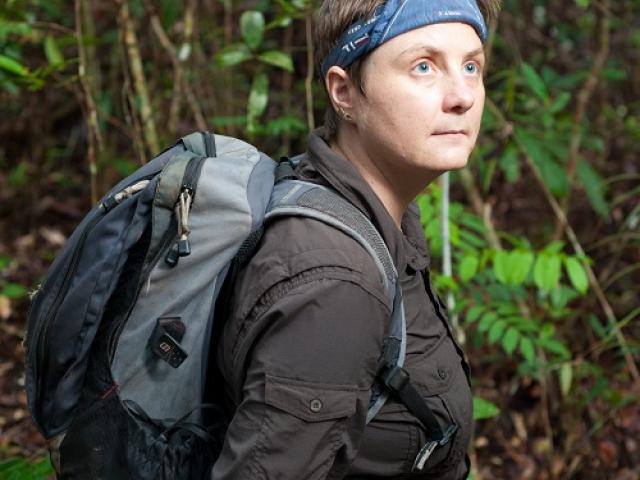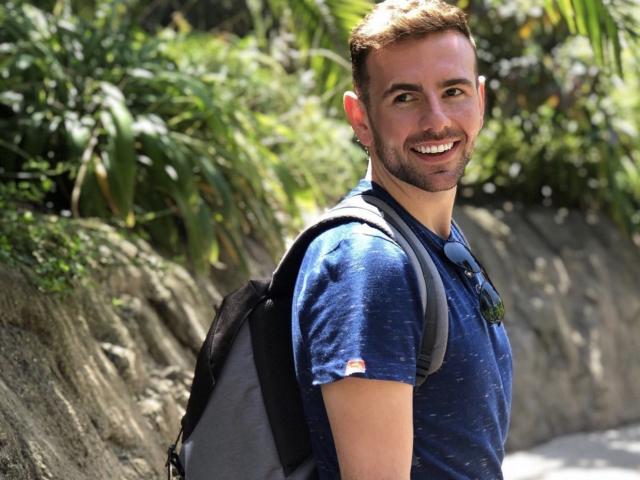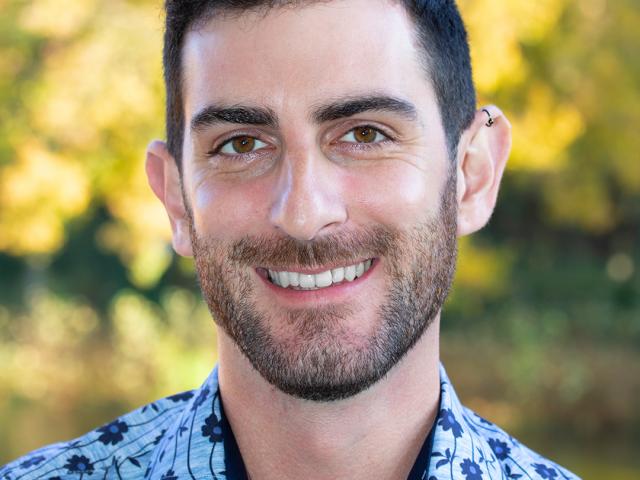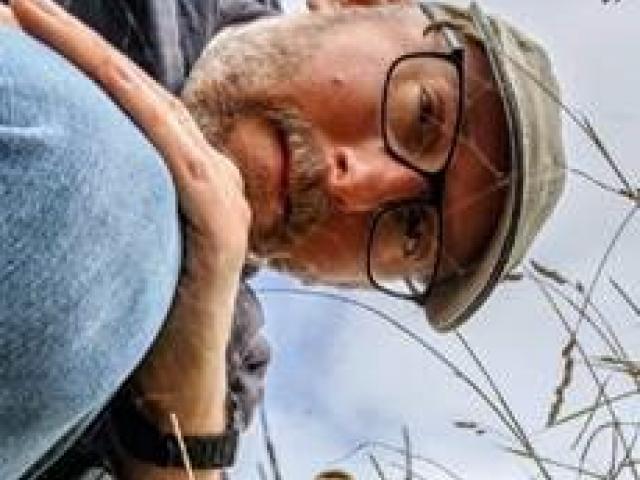Pride is celebrated throughout June every year to highlight the developments and rights of those in the LGBTQ+ (Lesbian, Gay, Bisexual, Transgender, Queer, and other identities) community.
It is important to stand in support of PRIDE to commemorate and celebrate diversity in a world that has been too often intolerant, oppressive, and cruel, to anyone who hasn’t fit what society, and for a long time, the law, dictated to be ‘normal’.
One way to support PRIDE is by increasing the visibility of the contributions to Conservation, and beyond, that people from the LGBTQ+ community have made. Gone are the days when only straight white people could break into the field, so this post shares with you some brilliant minds from across the world:
Bradley Neal (he/they)

Bradley is a Ph.D. student studying Urban Woodland Butterfly Conservation.
As an Associate Lecturer Bradley also delivers a module at the Open University exploring the responses to change in the Environment.
In addition to his passion for Butterflies and the environment, Bradley has given up his time to volunteer as a Mentor for Out in Stem, a non-profit group for professionals working in STEM that is a member of the LGBTQ+ community. In this role, Bradley supported students navigate the world of academia with a particular focus on supporting transgender, non-binary, and other non-gender-conforming people.
You can follow Bradley on Twitter here: @BradleyNealEnv
Susan Cheyne (She/Her)

Susan is a lesbian and a conservation biologist whose work has contributed to the rehabilitation, and reintroduction of different species.
Susan has dedicated a large portion of her career to raising awareness of the plight of wild gibbons and played a key part in their rehabilitation and reintroduction in Asia. Her work in this area includes being a founding member and now Vice-Chair of the IUCN (International Union for the Conservation of Nature) Species Survival Commission, Primate Specialist Group (PSG) Small Section on Apes which aims to conserve Hylobatidae, the family of primates Gibbons belong to.
As Co-Director of the Borneo Nature Foundation, Susan’s work has also confirmed clouded leopards in the peat-swamp forests of Indonesian Borneo, and from 2008 has headed a clouded leopard survey to determine the population density and distribution.
Since 2010 Susan has also been a Teaching Fellow at Oxford Brookes University teaching on the Primate Conservation MSc as well as supervising undergraduate, MSc, and PhD students.
To learn more about Susan and her work you can visit her website here.
Andrew Mooney (He/Him)

Based in Ireland, Andrew Mooney works as a conservation scientist and ecologist, having completed a Ph.D. in Zoology at Trinity College Dublin (TCD) in 2020. As featured in 500 Queer Scientists, Andrew has a particular interest in the conservation role, and potential of, zoos and aquariums, and he uses globally shared zoological data to inform conservation and management decision-making. He is now a Conservation and Research Officer at Dublin Zoo, where he is working to help transform Dublin Zoo into a zoo-based conservation organisation of global significance.
Andrew also contributes to Equality, Diversity, and Inclusion in the workplace, having sat on the Athena Swan process for four years while at TCD. This is an accreditation scheme and quality charter mark framework commissioned by the Equality Challenge Unit to support gender equality within higher education (HE). He has also contributed to Heal the Bay’s Queers on the Pier pride celebration and was the co-founder of Pride in Research, a now annual symposium at Trinity College Dublin highlighting the research and experiences of LGBTQ+ staff and students.
Andrew believes that “Conservation really is a people problem and is in many ways linked to social inequality. Zoos and aquariums have an important societal role to play in this respect, and they should be more outspoken in the fight against social inequality in all its forms, supporting and amplifying the voices of underrepresented and marginalised groups.”
You can follow Andrew on Twitter: @andymooney13
Steven Roe (He/Him)

With over 20 years of experience in bat biology, ecology, and survey methodology, in addition to twelve years in consultancy, Steven is one of the leading bat ecologists in the UK.
Steve's expertise focuses on bat biology, ecology, and survey methodology with a special interest in ultrasound analysis, cave ecosystems, and autumn swarming behaviour.
Accomplishments of Steve's involve being awarded Chartered Ecologist status by CIEEM in 2019, being a Guest Lecturer at the University of Plymouth, delivering lecturers to the course he studied: MSc Environmental Consultancy, in addition to being one of the organisers of the UK's first Autumn Swarming Bat Conference (2017), and having published a number of reports on the bat mating behaviours in the Peak. Steve also produces and presents the Bat Conservation Trust’s podcast BatChat which has been nominated for a second year running for the CIEEM NGO Impact Award later this month.
Currently, Steve works at FPCR Environment & Design Ltd. where he manages their 160 bat detector units and its ultrasound analysis lab team. In his spare time, he is leading a bat research project looking at the phenomenon known as 'autumn swarming' where large numbers of bats congregate to mate at the entrances to underground sites in the Peak District. Meanwhile, as an active volunteer and trusted expert to many bat groups, Steve was also nominated to the Bat Conservation Trust’s Board of Trustees where he is currently serving as vice-chair. During lockdown, he started moth trapping in his back garden and is slowly getting to grips with the macro moth species.
In addition to all things bat-related, at his current workplace at FPCR, an Environment and Design Consultancy, Steve is involved in co-ordinating an in-house LGBTQ+ staff network group in order to promote a sense of belonging and community for the organisation. He has recently contributed an article to CIEEM about supporting LGBTQ+ professionals in the ecology industry which can be read here.
Phil Saunders (He/Him)

Phil is a gay ecologist with a particular interest in birds and invertebrates. His professional journey in conservation didn’t commence until slightly later in life, following several years of working in theatre and the corporate consultancy sector. Then, having entered his thirties, he changed direction and completed an MSc and Ph.D., prior to working on various conservation projects across Europe and further afield. This has included several specialist bird research projects, such as monitoring the movements and productivity of Asian Houbara Bustards in Uzbekistan and the breeding ecology of Rollers in Cyprus.
Phil now works for Footprint Ecology; a small, specialist, a consultancy that solely works on conservation-related projects. His job largely revolves around finding sustainable solutions to balance nature conservation and countryside access, with much of this work focussing on important coastal sites for wintering birds.
Phil is delighted by the increased visibility and representation of LGTBQ+ ecologists within the UK conservation sector that he has witnessed over the last couple of decades but fully appreciates that there is still a long way to go with respect to equality for LGBTQ+ ecologists living or working in other parts of the world.


